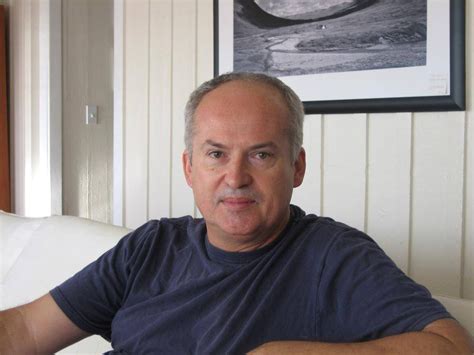A Quote by Robert M. Sapolsky
On an incredibly simplistic level, you can think of depression as occurring when your cortex thinks an abstract thought and manages to convince the rest of the brain that this is as real as a physical stressor.
Related Quotes
We live in the Age of the Higher Brain, the cerebral cortex that has grown enormously over the last few millennia, overshadowing the ancient, instinctive lower brain. The cortex is often called the new brain, yet the old brain held sway in humans for millions of years, as it does today in most living things. The old brain can't conjure up ideas or read. But it does possess the power to feel and, above all, to be. It was the old brain that caused our forebears to sense the closeness of a mysterious presence everywhere in Nature.
When you sleep your eyes move left and right and physical movement takes trauma and moves it from your frontal lobe to the back of your brain or to another part of the brain where you can store it that memory but when you think about those things that happened, you don't associate the feeling that normally comes with it. So the problem is if you have something traumatic happen and you are not getting a good amount of rest, it will stay in your frontal lobe.
There is one brain organ that is optimised for understanding and articulating logical processes and that is the outer layer of the brain, called the cerebral cortex. Unlike the rest of the brain, this relatively recent evolutionary development is rather flat, only about 0.32 cm (0.12 in) thick and includes a mere 6 million neurons. This elaborately folded organ provides us with what little competence we do possess for understanding what we do and who we do it.
So, you can define emotions very simply as the process of perceiving what is going on in the organs when you are in the throws of an emotion, and that is achieved by a collection of structures, some of which are in the brain stem, and some of which are in the cerebral cortex, namely the insular cortex, which I like to mention not because I think it's the most important, it's not.
If you think about it, you can have the best CGI, but you can always tell that it is CGI. Your brain can spot that is not real even though you think it looks cool. Your brain knows the truth, so you don't jump and you don't scream. It was very important for me to expose the audience to real elements.
I think animation is a very truthful way to express your thoughts, because the process is very direct. That's what I've always liked about animation, particularly abstract animation. You go from the idea to execution, straight from your brain. It's like when you hear someone playing an instrument, and you feel the direct connection between the instrument and his brain, because the instrument becomes an extension of his arms and fingers. It's like a scanner of the brain and thought process that you can watch, or hear.



































